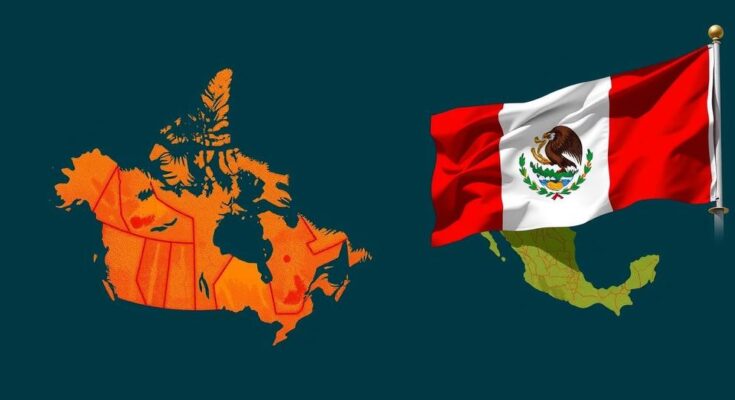President-elect Donald Trump announced plans to impose a 10% tariff on Chinese products and a 25% tariff on goods from Canada and Mexico. He justifies these measures as necessary to combat drug trafficking, particularly fentanyl, and illegal immigration. Trump’s tariffs are part of his broader “America first” policy, aiming to leverage economic pressure to achieve political outcomes related to national security.
President-elect Donald Trump has announced plans to impose significant tariffs on imports from China, Canada, and Mexico. He stated that American consumers will face an additional 10 percent tariff on Chinese goods and a 25 percent tariff on products from Canada and Mexico. Trump’s justification for these measures stems from concerns over rampant drug trafficking, particularly of fentanyl, and illegal immigration facilitated through these borders.
Through social media, Trump expressed frustration over China’s inadequate responses to drug trafficking and reiterated the urgency of resolving this issue. He noted that, despite warnings, drug shipments into the U.S. continue to rise alarmingly, primarily via Mexico. Consequently, he indicated that these tariffs would remain until drug trafficking and illegal immigration cease. Trump’s rhetoric reflects a broader strategy to pressure these nations to address these serious concerns, tying economic penalties to foreign policy goals.
Amid the backdrop of the ongoing 2024 election, Trump’s approach aims to reinforce his longstanding “America first” policy, suggesting that these tariffs serve as tools to achieve critical political objectives. The U.S. Census Bureau reports show that China accounts for a substantial portion of U.S. imports, underscoring the significant impact of these proposed tariffs on the global trade landscape.
Billionaire investor Bill Ackman commented on Trump’s strategy, advocating that using tariffs as tools for economic leverage aligns with national interests. This perspective highlights a novel approach to conducting foreign relations, even before Trump officially assumes office. Ackman’s remarks conveyed skepticism about the actual implementation of the tariffs, suggesting that their duration depends on Mexico’s and Canada’s compliance regarding immigration and drug trafficking.
In summary, the proposed tariffs serve both as a mechanism to combat the flow of drugs and a means to influence immigration policy. Trump’s administration, still on the horizon, appears to set a distinct economic course prioritizing national security over free trade principles, with potential ramifications on bilateral relations and global supply chains.
Donald Trump’s recent statements regarding tariffs on imports are deeply rooted in the broader context of the United States’ struggle with drug trafficking and illegal immigration. Fentanyl, a potent synthetic opioid, has significantly impacted public health and safety in America, prompting calls for urgent policy changes. Tariffs, traditionally a tool for economic regulation, are being repurposed in this instance to exert pressure on foreign governments to mitigate these critical issues. Trump’s approach signifies a shift in trade policy, aiming to intertwine economic sanctions with strategic national security objectives. This intersection of trade and foreign policy is becoming increasingly relevant in today’s geopolitical landscape as nations grapple with common challenges such as drug trafficking and immigration.
In conclusion, President-elect Donald Trump’s proposed tariff increases on China, Canada, and Mexico represent a significant shift in U.S. trade policy, merging economic strategy with national security concerns. These measures are primarily framed as responses to drug trafficking and illegal immigration, with Trump vowing that the tariffs will remain until these issues are adequately addressed. This proactive approach is emblematic of Trump’s broader “America first” agenda, positioning tariffs not just as economic measures but as instruments of foreign policy. The potential consequences of these tariffs for international relations and trade dynamics will likely unfold as Trump assumes office and beyond.
Original Source: www.newsweek.com




